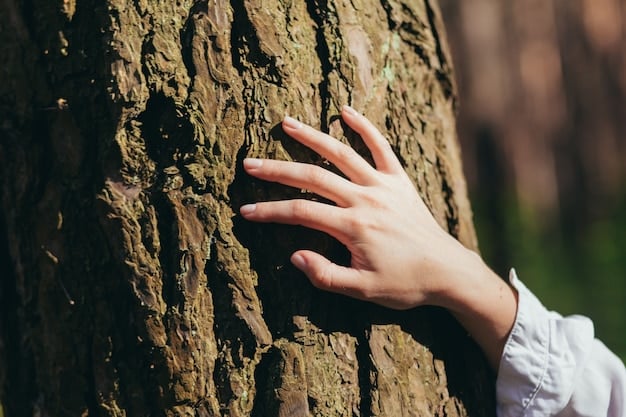Nature’s Power: 30 Minutes Outdoors for Stress Reduction

The Power of Nature: Can Spending Just 30 Minutes Outdoors Reduce Your Stress Levels? Absolutely! Studies show that even brief nature exposure can significantly lower cortisol levels, reduce stress, and improve overall well-being, making it a simple and effective stress management tool.
In today’s fast-paced world, stress has become an unwelcome companion for many. But what if the answer to managing stress was simpler than we thought? Could the power of nature: can spending just 30 minutes outdoors reduce your stress levels?
The Science Behind Nature’s Stress-Relieving Effects
The connection between nature and reduced stress levels isn’t just a feeling; it’s backed by science. Research has consistently demonstrated the positive impact of natural environments on our mental and physical health. Let’s delve into the specific mechanisms that make this happen.
Cortisol Reduction
One of the primary ways nature helps reduce stress is by lowering cortisol levels. Cortisol is known as the “stress hormone” because it’s released when we’re under pressure.
Heart Rate and Blood Pressure
Exposure to nature can also lead to a decrease in heart rate and blood pressure, two key indicators of stress. Being in a natural environment promotes relaxation.
- Studies have shown that people who spend time in forests have lower blood pressure compared to those who spend time in urban environments.
- Green spaces in cities can help reduce urban dwellers’ overall stress levels by promoting a more relaxed physiological state.
- Even the presence of plants indoors can contribute to lower blood pressure and heart rate.
In conclusion, the scientific evidence clearly supports the idea that spending time in nature has a tangible, positive impact on our stress levels. By regulating cortisol, heart rate, and blood pressure, nature provides a holistic approach to stress management.

Creating Your 30-Minute Nature Escape
Incorporating just 30 minutes of nature into your daily routine can be surprisingly simple and profoundly effective. It doesn’t require grand gestures; it’s about finding small, consistent ways to connect with the natural world.
Urban Parks and Green Spaces
Even in the heart of the city, urban parks and green spaces offer a valuable opportunity to escape the concrete jungle. These spaces provide a refuge from the noise and chaos of urban life.
Mindful Nature Walks
Transforming your nature time into a mindful experience can amplify its benefits. This involves paying deliberate attention to your surroundings and engaging all your senses.
- Take slow, deliberate steps, noticing the way your feet feel on the ground.
- Engage your sense of smell by inhaling the fresh air and the earthy scents of plants and soil.
- Notice the way the sunlight filters through the trees, creating patterns of light and shadow.
Effectively creating a 30-minute nature escape is about intentionality and mindfulness. Whether it’s a planned trip to a park or a simple walk around the block, the key is to fully engage with your surroundings, allowing nature to work its stress-relieving magic.
The Psychological Benefits: Beyond Stress Reduction
Beyond the physiological impacts like reduced heart rate and cortisol levels, spending time in nature also offers significant psychological benefits. These benefits contribute to a sense of well-being and mental clarity.
Boosting Mood and Emotional Well-being
Exposure to nature has a direct impact on improving mood and overall emotional well-being. Nature can stimulate the release of endorphins.
Enhancing Focus and Creativity
Time spent in nature not only reduces stress but also has a remarkable effect on cognitive functions such as focus and creativity. Natural environments provide a restorative effect.
- Studies have shown that children with ADHD experience improved concentration after spending time in green settings.
- Exposure to natural light helps regulate the body’s circadian rhythm, leading to better sleep and improved cognitive function.
- Engaging in outdoor activities can spark creativity and problem-solving skills by providing a fresh perspective and new sensory experiences.
In conclusion, the psychological benefits of spending time in nature extend far beyond stress reduction. By boosting mood, enhancing focus, and fostering creativity, nature offers a holistic approach to improving mental and emotional well-being.
Practical Tips for Maximizing Your Outdoor Time
To get the most out of your time in nature, consider integrating specific practices that enhance your experience. These tips can help you deepen your connection with nature and amplify the stress-reducing benefits.
Leave Technology Behind
One of the simplest yet most effective ways to maximize your time in nature is to leave your technology behind. This allows you to fully immerse yourself in the natural environment.
Engage in Simple Outdoor Activities
Engaging in simple outdoor activities can transform your time in nature from passive observation to active participation.
- Try gardening, even if it’s just tending to a small herb garden on your balcony.
- Practice outdoor yoga or meditation to combine physical activity with mindfulness.
- Take up birdwatching, using a field guide to identify different species and learn about their habitats.
By incorporating these practical tips, you can transform your outdoor time into a genuinely enriching and therapeutic experience. Leaving technology behind, engaging in simple activities, and practicing mindfulness can deepen your connection with nature and maximize its stress-reducing benefits.

Overcoming Obstacles: Making Time for Nature in a Busy Schedule
One of the biggest challenges to spending time in nature is fitting it into a busy schedule. However, with a bit of creativity and planning, it’s entirely possible to integrate nature into your daily life.
Scheduling Nature Time
Treating nature time as a non-negotiable appointment in your schedule can help ensure that it doesn’t get pushed aside by other commitments. It’s important to set realistic goals.
Combining Activities
Another effective strategy is to combine activities you already do with time in nature. This can make incorporating nature into your routine more seamless and efficient.
- If you enjoy reading, take your book to a park or garden instead of staying indoors.
- Conduct walking meetings instead of sitting in an office.
- Walk or bike to work or errands instead of driving.
Overcoming these obstacles involves creativity, planning, and a shift in mindset. By scheduling nature time, finding small pockets of opportunity, and combining activities, you can make spending time in nature a regular and sustainable part of your life.
Long-Term Benefits: Cultivating a Lasting Connection with Nature
The benefits of spending time in nature extend far beyond immediate stress relief. Cultivating a lasting connection with the natural world can have profound and enduring impacts on your overall well-being and quality of life.
Increased Environmental Awareness
Regular exposure to nature fosters a deeper appreciation for the environment and a greater sense of responsibility towards protecting it. When you spend time outdoors, you witness the interconnectedness of ecosystems.
Enhanced Resilience and Coping Skills
A strong connection with nature can enhance your resilience and coping skills when faced with life’s challenges. Natural environments offer a sense of perspective and grounding.
- Time in nature can provide a break from stressful situations, allowing you to return with a clearer mind and renewed energy.
- Exposure to greenery and open spaces can help reduce feelings of anxiety and depression, promoting a more positive outlook.
- Connecting with nature can foster a sense of awe and wonder, reminding you of the beauty and resilience of the natural world.
By viewing nature as a vital part of our lives, we can unlock its full potential to enhance our well-being and create a more sustainable future for ourselves and generations to come. The journey towards this lasting connection begins with a commitment to spending time in nature, understanding its value, and actively protecting it.
| Key Point | Brief Description |
|---|---|
| 🌿 Nature & Cortisol | Spending time outdoors can significantly lower cortisol levels, reducing stress. |
| 🌳 Urban Green Spaces | Parks offer accessible nature escapes, even in urban environments. |
| 🧘 Mindfulness in Nature | Engaging all senses during nature walks enhances stress reduction. |
| ☀️ Mood & Focus | Nature improves mood, enhances focus, and boosts emotional well-being. |
FAQ
Studies suggest that even 20-30 minutes in a natural setting can significantly lower cortisol levels and reduce stress. The effects can be felt almost immediately!
Any form of nature exposure can be beneficial. Walking in a park, gardening, or simply sitting under a tree can all have a positive impact on stress levels.
While nature photos can offer some relaxation, they don’t provide the full sensory experience of being in nature. Physical presence is more effective for stress reduction.
Seek out local parks, botanical gardens, or even small patches of greenery. You can also bring nature indoors with houseplants. Balconies can also contribute!
Schedule it like any other important appointment. Combine it with other activities, such as walking during lunch breaks or having walking meetings outside.
Conclusion
Taking just 30 minutes to immerse yourself in nature can serve as a potent antidote to stress, fostering enhanced well-being and mental clarity. By integrating regular outdoor time into your daily routine, you unlock the door to a healthier, more balanced life, enriched by the simple yet profound power of the natural world.





